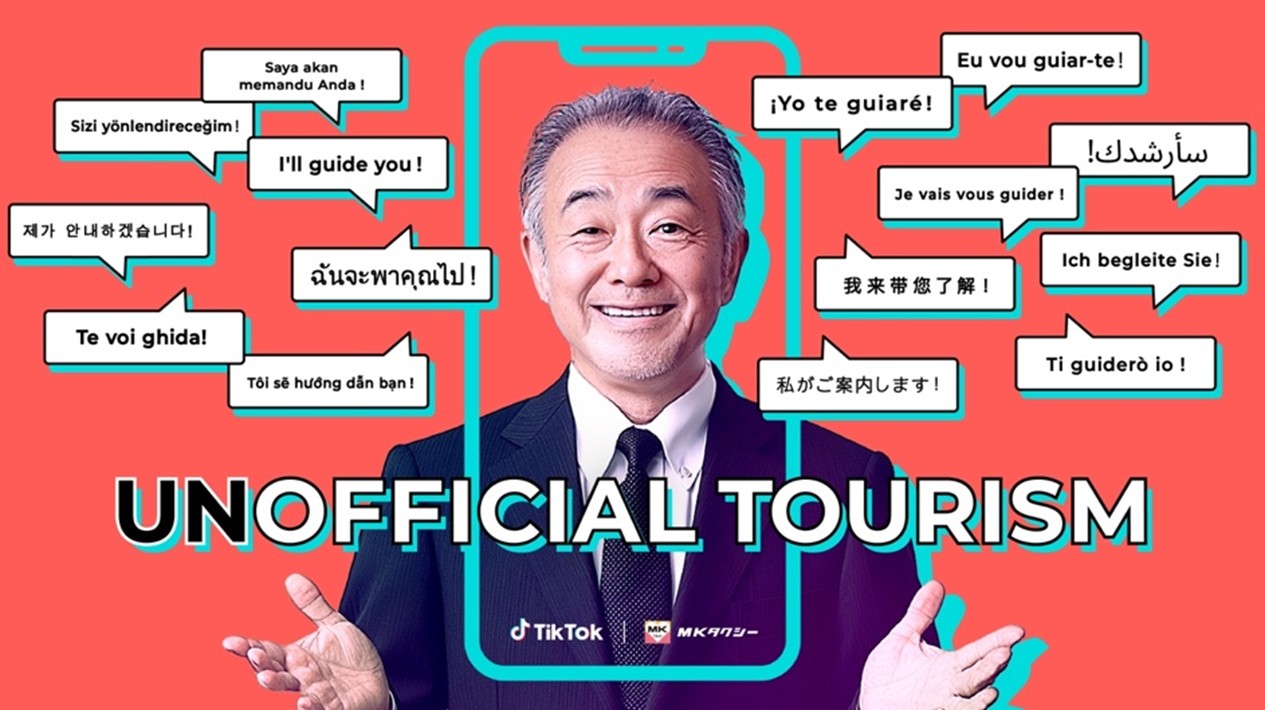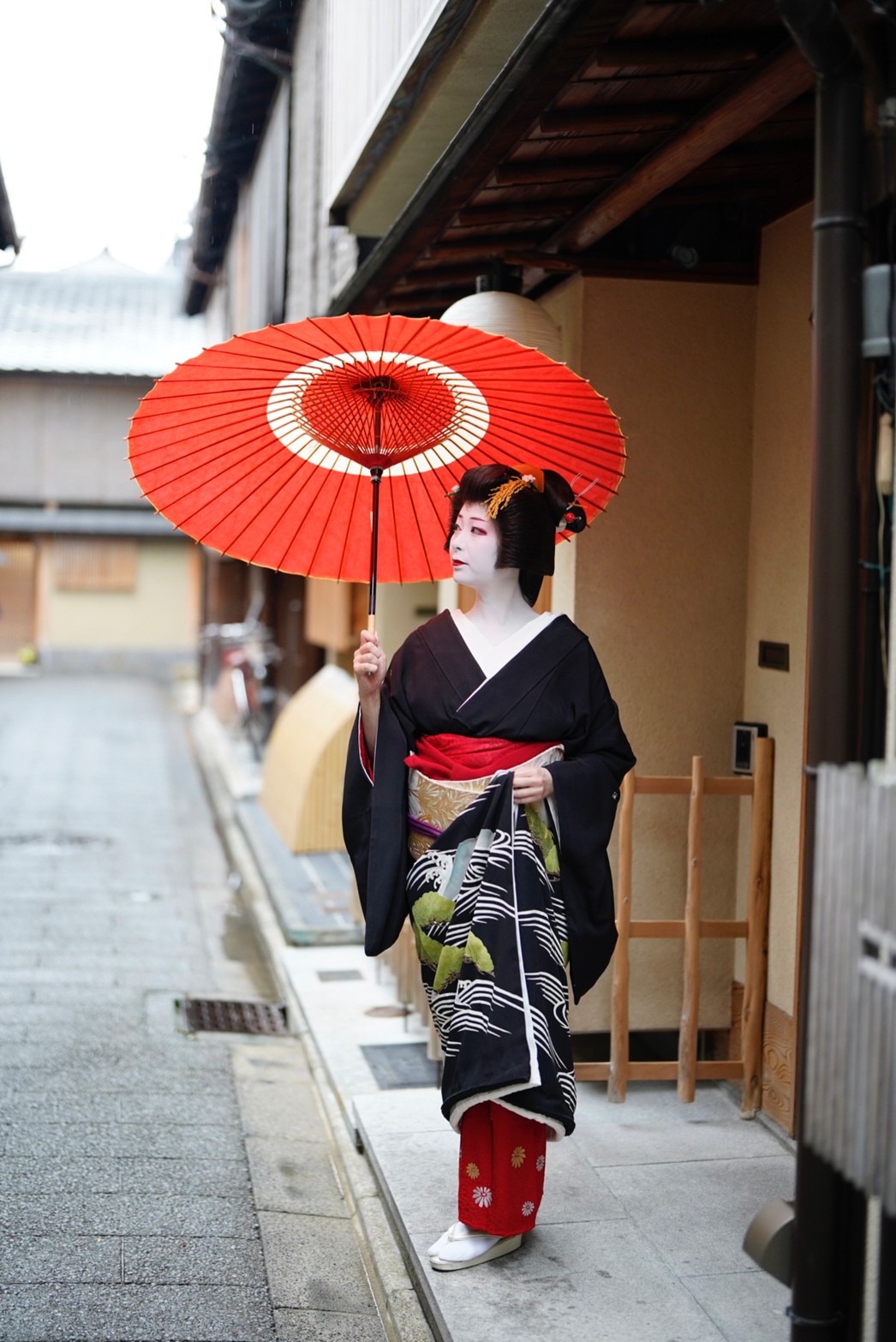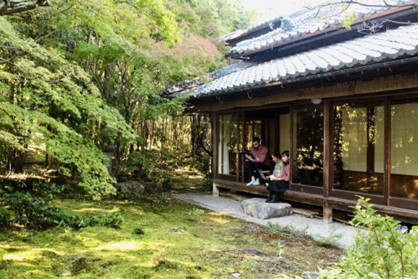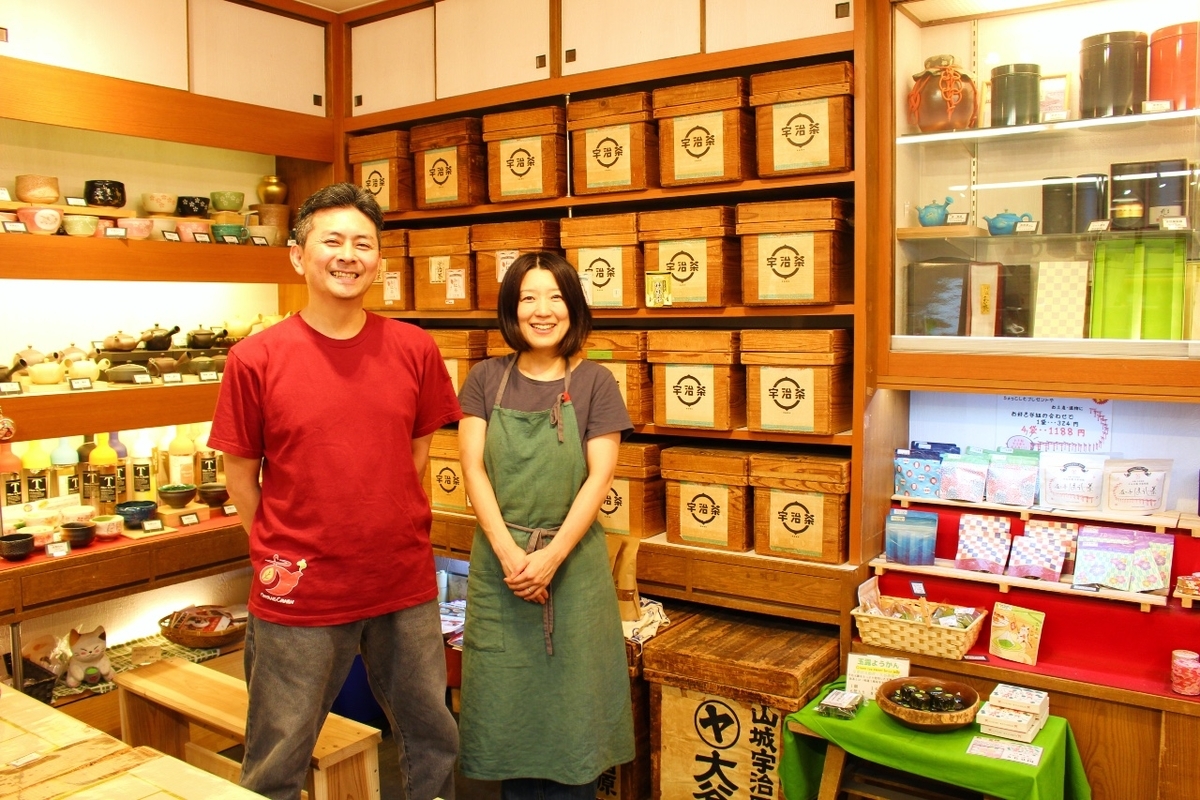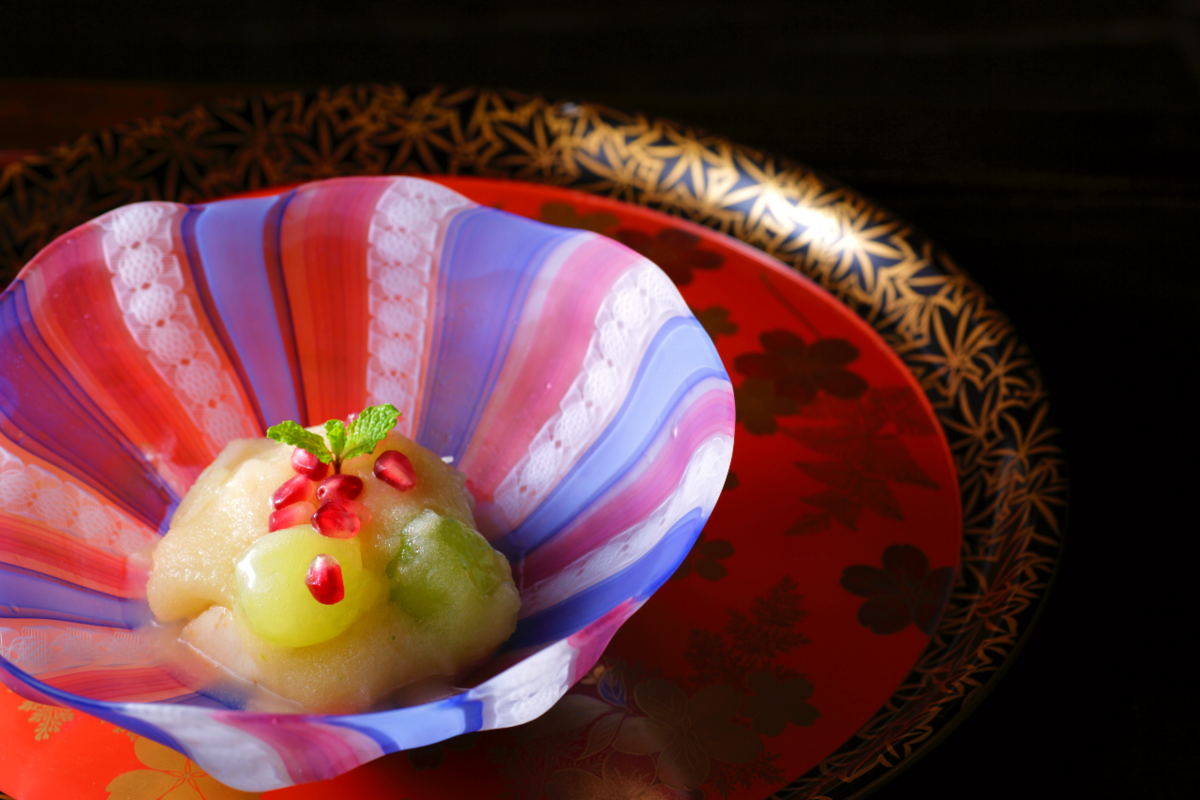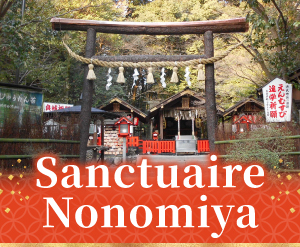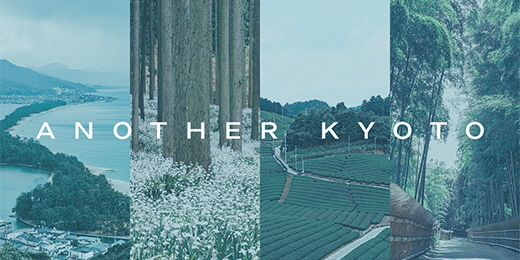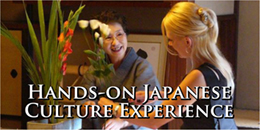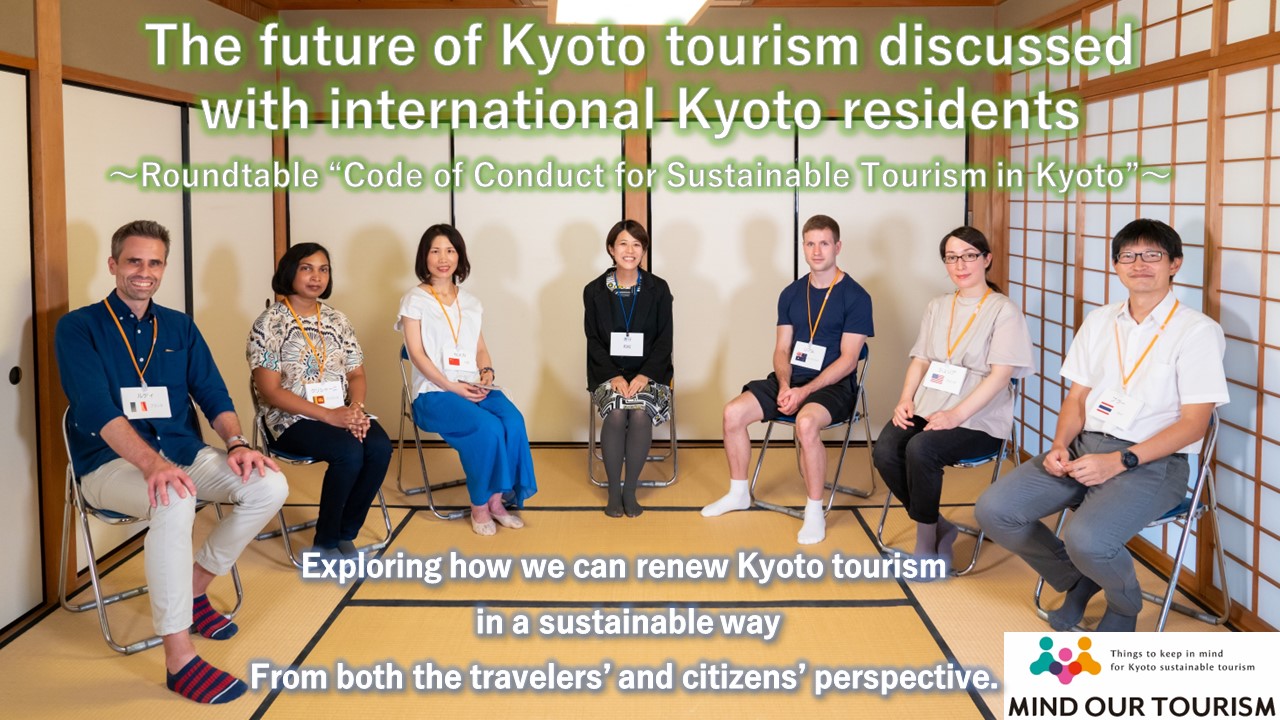
Depuis le début de la pandémie mondiale de COVID-19 en 2020, les restrictions de voyage ont eu de graves répercussions sur les populations du monde entier, notamment sur les secteurs liés au tourisme. Kyoto n'a pas fait exception, où divers types d'entreprises, des agences de voyages aux hébergements, en passant par les restaurants et les artisans traditionnels, ont été gravement touchées. Cependant, alors que les restrictions d'entrée au Japon sont désormais considérablement assouplies, certains s'inquiètent d'une réapparition des problèmes de congestion et de comportement.
La ville de Kyoto et l'Association du tourisme de la ville de Kyoto travaillent ensemble pour promouvoir le Code de conduite pour le tourisme durable à Kyoto afin d'éviter que les conditions pré-pandémiques ne se reproduisent et de transmettre les valeurs exceptionnelles de Kyoto à l'avenir en s'adressant à tous ceux qui sont liés au tourisme de Kyoto, y compris l'industrie du tourisme, les touristes et les résidents.
Cette fois, nous avons discuté de la manière dont nous pourrions mettre à jour le tourisme de Kyoto d'une manière adaptée au monde post-pandémique avec des résidents internationaux de Kyoto qui ont à la fois le point de vue des voyageurs et des citoyens.

Indice
Profil des participants

Rudy (France)
J'ai grandi près de la frontière franco-belge. J'ai étudié le multiculturalisme dans une université française. Je vis à Kyoto avec mon épouse birmane.
Krishani (Sri Lanka)
Mariée à un Japonais depuis 10 ans, elle travaille à la Maison communautaire internationale de Kyoto.
Cesca (Chine)
Originaire de la province du Zhejiang, je suis photographe et interprète à la Maison de la communauté internationale de Kyoto. J'apprécie les visites de sanctuaires et de temples.

Liam (Australie)
Étudiant diplômé à l'Université Doshisha. J'ai déménagé à Kyoto en avril. J'y ai également vécu il y a six ans. Je pratique le jiu-jitsu brésilien.
Julia (États-Unis)
Né aux États-Unis, arrivé au Japon enfant. J'ai grandi en faisant des allers-retours. Interprète/traducteur/guide. Aime faire du tourisme même sans guide.
Prach (Thaïlande)
Originaire de Bangkok, il vit à Kyoto depuis l'université. Il est membre du personnel d'une association à but non lucratif et interprète/traducteur. Il aime faire du jogging le long de la rivière Kamo.
Modérateur/intervieweur : Arimatsu de l'Association du tourisme de la ville de Kyoto
Remerciements spéciaux : Kyoto City International Foundation
*Cette discussion a eu lieu le 3 septembre 2022
Q4. Ce que vous ne remarquerez peut-être pas si vous n'avez jamais vécu à l'étranger : la merveilleuse et déroutante hospitalité de Kyoto
Arimatsu:En vivant à Kyoto, y a-t-il des services qui vous ont particulièrement impressionné ? À l'inverse, y a-t-il des services dont vous n'avez pas compris l'utilité ?
Liam : L'hospitalité des restaurants et des bars. Par exemple, quand je suis allé dans un izakaya, le propriétaire a engagé la conversation avec moi. Je suis impressionné par la facilité avec laquelle les gens communiquent avec les clients ici.
Rudy : L'hospitalité est fantastique au Japon, et pas seulement dans les magasins. C'est ce que je ressens toujours lorsque je vais à la mairie. J'apprécie la gentillesse et l'aide des gens.
Julia : Venant d'une région où les quatre saisons ne sont pas si distinctes, j'apprécie la façon dont les chambres de style japonais à Kyoto arborent des fleurs ou des rouleaux suspendus différents selon la saison. C'est comme un message d'accueil saisonnier de toute la pièce, et c'est joli.
Arimatsu : D’autre part, y a-t-il des services qui vous déçoivent ?
Julia : Parfois, oui. Par exemple, lorsque je vais dans un temple ou un sanctuaire et que j'entends les annonces enregistrées des haut-parleurs alors que je souhaite simplement profiter du calme. Ou lorsque je vois trop de panneaux perturber la vue. Ou encore, le bruit de ces sacs à chaussures en plastique (pour ranger ses chaussures après les avoir enlevées). Ça gâche l'atmosphère quand ce bruit qui me rappelle un supermarché se fait entendre partout dans les zones tranquilles. J'aimerais au moins qu'il s'agisse de matériaux recyclables en compost, ou fabriqués à partir de matériaux durables comme le bambou.
Rudy : En parlant de sacs, lors de ma première visite au Japon, j'ai remarqué la multitude de couches d'emballages. Pour des raisons environnementales, j'ai pensé qu'il serait préférable de réduire un peu l'emballage.
Krishani : Ils finissent souvent par être jetés une fois ramenés à la maison. Je n'ai donc pas vraiment besoin d'emballage supplémentaire.
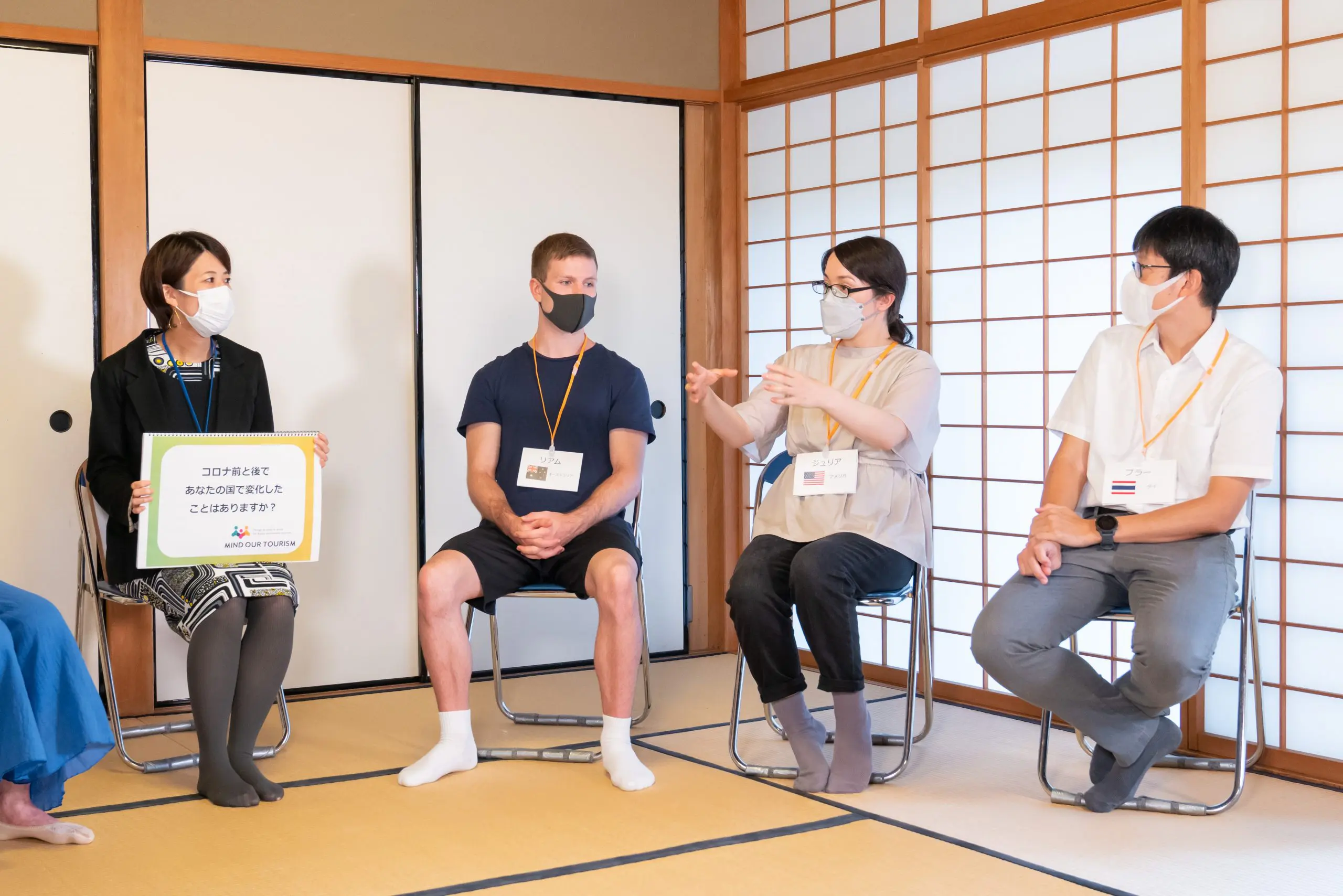
Prach: Je pense que ce serait bien si le dos du papier d'emballage pouvait être réutilisé comme papier à lettres. Mais presque tout est jeté après une seule utilisation. C'est un gaspillage terrible.
Krishani : D'un autre côté, la coutume d'emballer fait partie intégrante de la culture japonaise, il serait donc judicieux de la préserver d'une manière ou d'une autre. Emballer avec des furoshiki, par exemple, est très japonais et tendance.
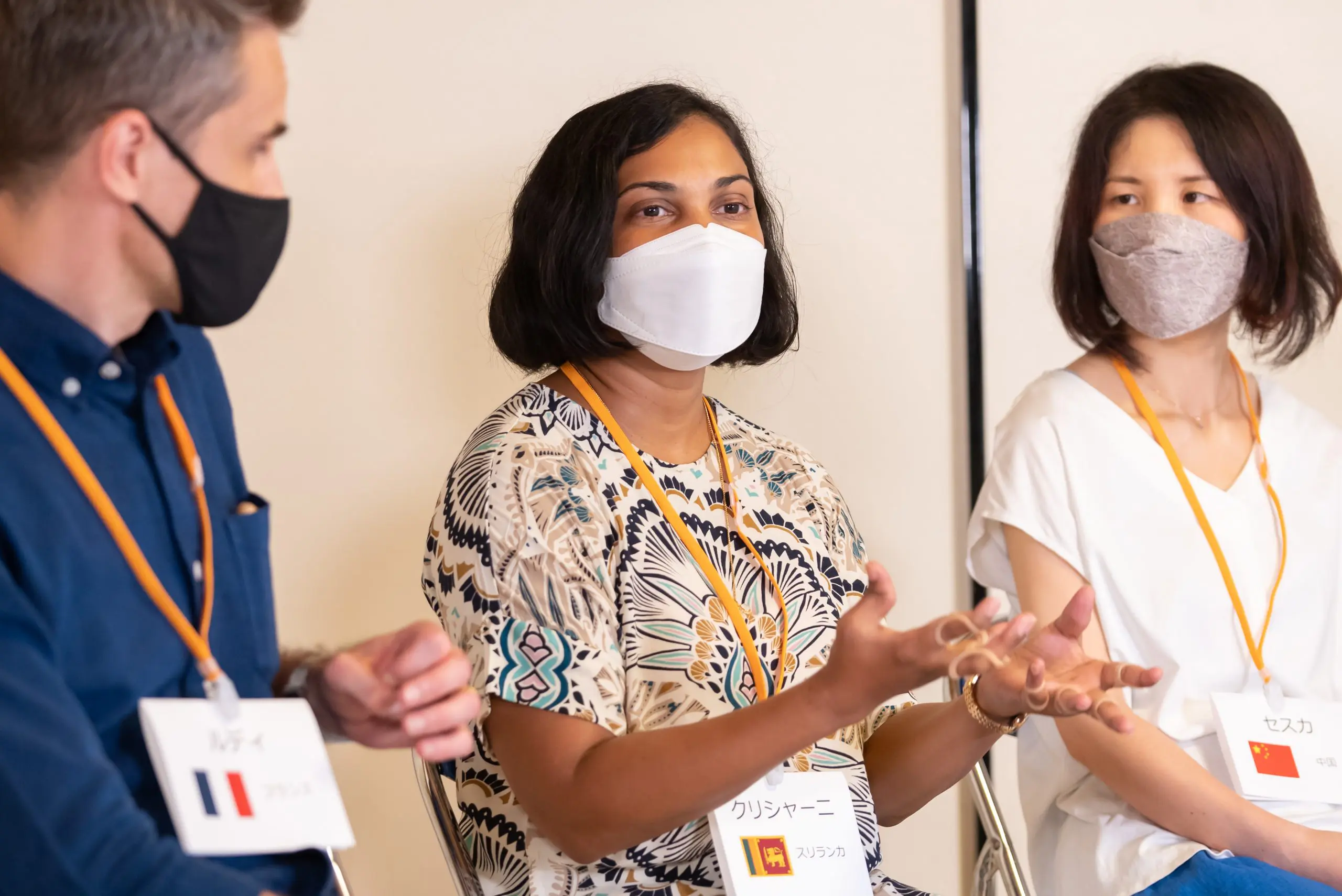
Rudy : C'est tout à fait acceptable qu'ils soient enveloppés dans des furoshikis ou enveloppés et attachés de façon traditionnelle avec des tenuguis « kawaii (mignons) ». [Les furoshikis sont des tissus carrés utilisés pour envelopper et transporter, et les tenuguis sont des tissus rectangulaires en coton utilisés pour envelopper ou essuyer ; les deux existent dans une grande variété de couleurs et de motifs.] Mais s'il ne s'agit pas de sacs en plastique (et non de jolis sacs), je pense que nous devrions trouver des moyens de les réduire.
Julia : L'art du bel emballage est un trait caractéristique de la culture japonaise, je ne pense donc pas que tous les emballages soient mauvais. Par exemple, j'espère que l'emballage traditionnel et raffiné sera réservé aux cadeaux importants lors d'occasions spéciales. En revanche, l'emballage quotidien des cadeaux ou souvenirs pourrait être réduit ou simplifié.
Rudy : Même les précieuses traditions de la culture japonaise ne peuvent être préservées si l'environnement est détruit. Je pense qu'il est important de trouver des solutions durables, tant pour l'environnement que pour la culture.
Q5. Selon vous, que pourrait-on faire pour améliorer le tourisme à Kyoto ?
Arimatsu : Enfin, concernant le tourisme post-covid à Kyoto, comment pensez-vous que nous pouvons l’améliorer ?
Rudy : Kyoto joue un rôle important pour les visiteurs du Japon, car ils viennent y découvrir la culture japonaise. Par culture, j'entends non seulement les célèbres temples et sanctuaires, mais aussi la vie quotidienne des habitants. Les visiteurs sont fascinés par les différences de coutumes et d'aspects culturels intégrés à la vie quotidienne, d'autant plus qu'elles ne sont pas décrites dans les guides touristiques. Il est également important d'expliquer clairement les différences de savoir-vivre et d'étiquette, même si elles peuvent paraître évidentes aux Japonais.
Krishani : Je pense que les touristes qui viennent au Japon pour la première fois peuvent se sentir nerveux.
On les emmène souvent dans les temples et les magasins des sites touristiques, mais je pense qu'il serait bien qu'on leur donne plus d'informations sur les endroits où ils pourraient passer un moment de détente, par exemple, prendre le thé sur une pelouse dans un parc.
Cesca : Je pense qu'il serait bon que les résidents internationaux de Kyoto approfondissent leurs liens avec la communauté locale. Ils pourraient servir de passerelle entre leur pays et le Japon en partageant des informations sur les réseaux sociaux avec leurs compatriotes. Je pense que la meilleure façon de communiquer des informations détaillées sur Kyoto est de passer par des personnes du même pays. Je pense qu'il serait bon d'approfondir les échanges culturels entre les étrangers vivant au Japon et les Japonais.
Arimatsu : Vous avez évoqué la diffusion d'informations sur les visites touristiques. Concernant la diffusion de ces informations, les professionnels du tourisme, mais aussi les habitants de Kyoto, cherchent encore des moyens d'informer les touristes sur les us et coutumes. En tant que résident international, y a-t-il des moyens de communication qui, selon vous, seraient bien accueillis ou faciles à comprendre ?
Julia : Une chose est sûre : le mot « ne fais pas » peut vous donner l’impression d’être traité comme un enfant. Vous êtes adulte et pouvez penser et agir par vous-même. Si quelqu’un vous dit : « Ne fais pas ceci, ne fais pas cela », vous aurez l’impression d’être réprimandé par un instituteur.
Krishani : Oui, les touristes étrangers qui viennent au Japon pour la première fois peuvent être particulièrement ignorants des coutumes et des bonnes manières japonaises. Ils n'auront pas l'occasion de les apprendre sans être informés. Je pense que les étrangers apprécieraient d'être informés le plus tôt possible.
Rudy : Le problème, c'est qu'il n'y a aucune possibilité de s'informer. On pourrait peut-être distribuer des brochures sur les bonnes manières à l'arrivée à l'aéroport. Que diriez-vous d'un manga kawaii ?
Cesca : Je pense qu'il devrait y avoir une vidéo amusante que tout le monde peut regarder pour apprendre les bonnes manières d'un habitant de Kyoto de manière divertissante.
Julia : Que diriez-vous de diffuser cette vidéo ou cet anime dans l'avion qui arrive au Japon ?
Prach: Il serait judicieux de mettre en ligne sur YouTube une vidéo intéressante, comme « Comment devenir un Kyotoite parfait », et d'en inclure le lien sur les sites web consacrés au tourisme à Kyoto ou dans les courriels des agences de voyages. Je pense qu'il serait judicieux de mettre en place un système permettant à chaque voyageur international se rendant à Kyoto de visionner une vidéo similaire. Il serait préférable qu'ils se renseignent avant leur arrivée au Japon.
Rudy : >Surtout, il faut faire comprendre aux gens qu'il est amusant d'apprendre la vraie culture japonaise, y compris les coutumes et les bonnes manières. Se faire simplement dire de « suivre les bonnes manières » pourrait donner envie aux gens de faire l'inverse. Comme vous le savez, certains Français aiment transgresser les règles (rires).
Julia : Je pense qu’il faut trouver un moyen de rendre l’apprentissage de la culture ou des bonnes manières japonaises amusant.
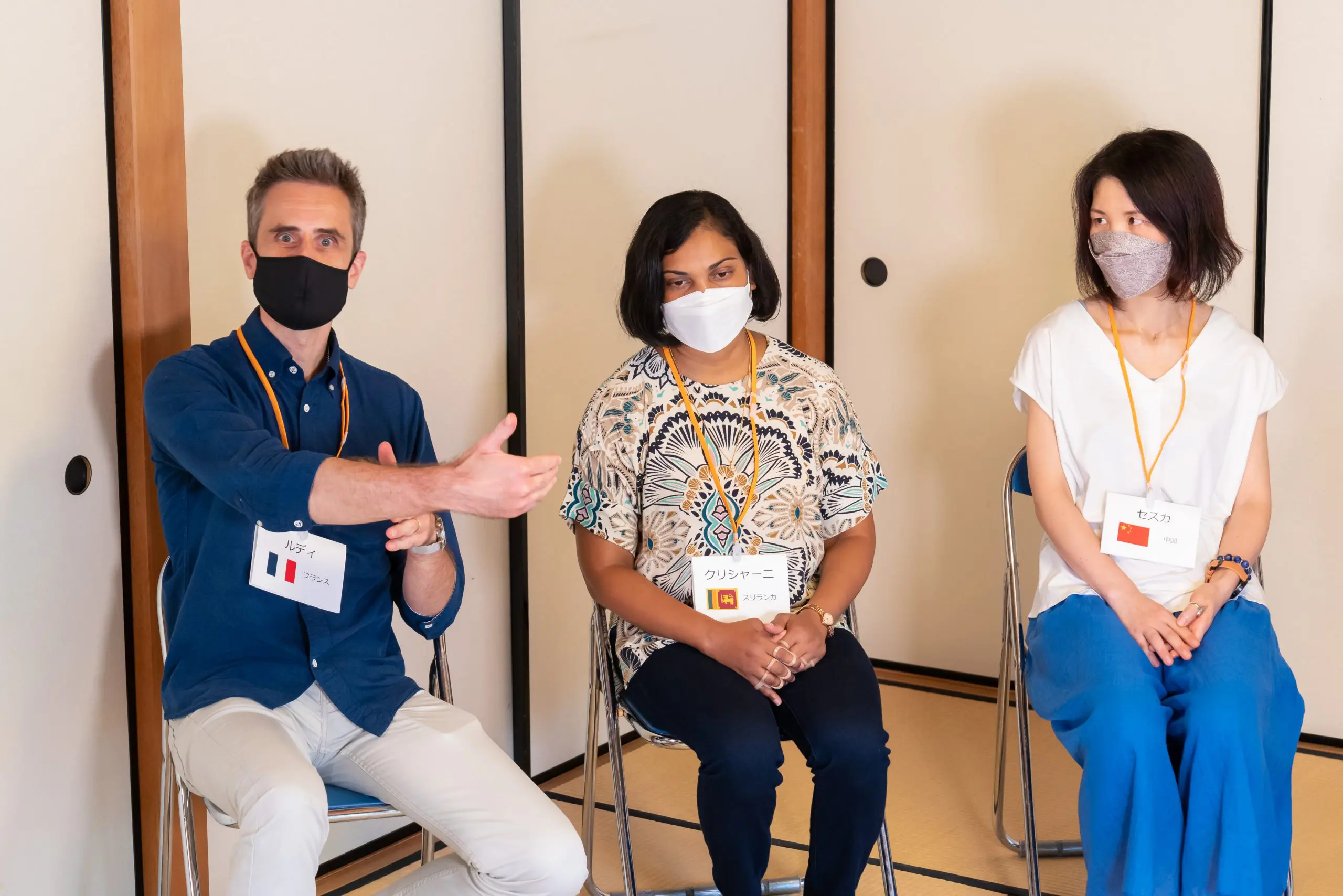
Rudy : Et si vous disiez : « Pourquoi ne pas vivre comme un Kyotoite pendant votre voyage ? »
Arimatsu : Ah, c'est une idée intéressante !
Rudy : En fait, je pense que les gens voudraient connaître les raisons du comportement des Japonais. Comprendre ces raisons donnerait envie d'essayer par soi-même, plutôt que de se faire simplement dire ce qu'il ne faut pas faire.
Prach: Pourquoi ne pas créer une application pour « vivre l'expérience d'un Kyotoite » et la faire télécharger ? Ce serait bien si les visiteurs pouvaient apprendre en accomplissant des missions et en gagnant des points, comme dans un jeu. On pourrait aussi rendre l'expérience plus intéressante en attribuant des rangs comme « expert » et « professionnel » en fonction du nombre de points.
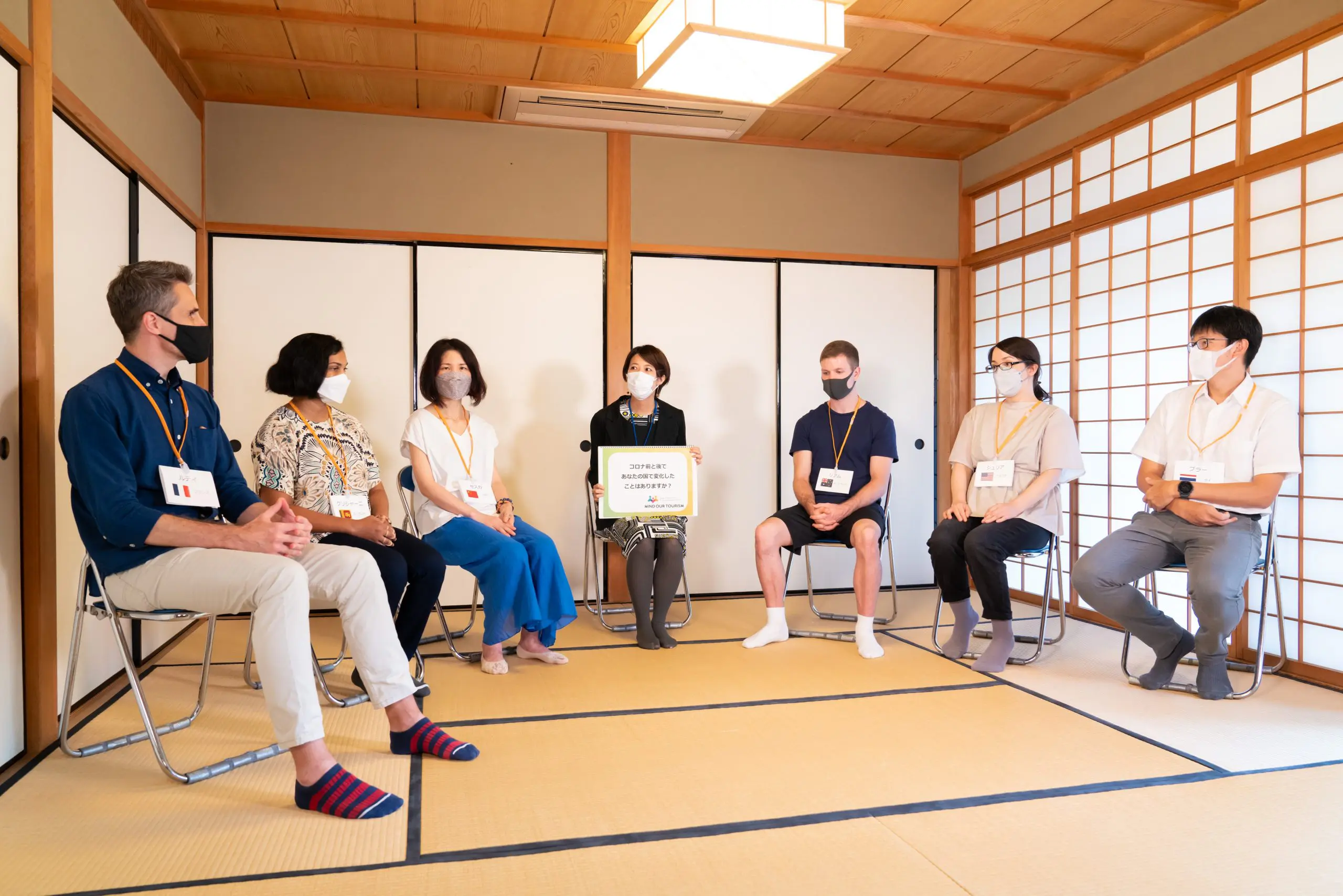
Arimatsu : Il serait préférable que les gens puissent profiter du tourisme à Kyoto d’une manière qui leur permette d’apprendre ou de participer à ce qui compte pour les habitants de Kyoto et qu’ils s’efforcent de préserver.
Rudy : Tout d’abord, ceux qui viennent à Kyoto le font par intérêt pour la culture japonaise. Kyoto est considérée comme la capitale culturelle du Japon. Les gens pourraient souhaiter se comporter comme les habitants de Kyoto s’ils souhaitaient s’immerger pleinement dans la culture japonaise lors de leur séjour à Kyoto. Cela contribuerait ainsi à résoudre certains problèmes liés aux différences de coutumes et de mentalités.
Prach: Parallèlement, je pense qu'il est nécessaire que les Kyotoïtes prennent conscience de la diversité des cultures du monde et des mentalités des visiteurs étrangers. L'idéal serait de favoriser la compréhension mutuelle des cultures.
Arimatsu : Merci beaucoup à tous. Je pense que notre discussion a été très enrichissante.
Trouver des moyens de communiquer sur les coutumes et les manières locales de Kyoto aux touristes issus de divers horizons culturels a été une question urgente pour nous lorsque nous envisageons l'avenir du tourisme de Kyoto après la pandémie.
Ce qui a particulièrement retenu notre attention lors de cette table ronde, c'est la description par Julia de la sensation d'être traité comme un enfant. Nous avons réalisé que nous pouvions transmettre des messages, en demandant de « suivre les règles et les bonnes manières », d'une manière qui pouvait être perçue comme oppressive. Il était tout aussi alarmant d'entendre Rudy évoquer le risque de contre-réaction que cela pouvait susciter.
Nous sommes conscients des nombreux défis à relever. Cependant, nous espérons que ce compte rendu de la table ronde vous aura permis de comprendre l'importance de la compréhension mutuelle et de l'acceptation des différences entre les pays et les cultures. Nous pouvons tous réfléchir à nous-mêmes et mettre en pratique les inspirations que nous avons acquises au travail et dans notre vie quotidienne. Nous comptons sur votre soutien pour moderniser ensemble le tourisme à Kyoto !
